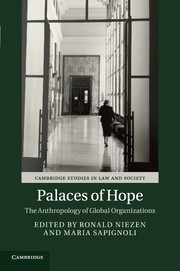Book contents
- Palaces of Hope
- Cambridge Studies in Law and Society
- Palaces of Hope
- Copyright page
- Contents
- Contributors
- Acknowledgments
- Abbreviations
- 1 Introduction
- 2 Heart of Darkness: An Exploration of the WTO
- 3 Horseshoe and Catwalk: Power, Complexity, and Consensus-Making in the United Nations Security Council
- 4 A Kaleidoscopic Institutional Form: Expertise and Transformation in the UN Permanent Forum on Indigenous Issues
- 5 The ‘Public’ Character of the Universal Periodic Review: Contested Concept and Methodological Challenge
- 6 Meeting “the World” at the Palais Wilson: Embodied Universalism at the UN Human Rights Committee
- 7 Expertise and Quantification in Global Institutions
- 8 From Boardrooms to Field Programs: Humanitarianism and International Development in Southern Africa
- 9 Global Village Courts: International Organizations and the Bureaucratization of Rural Justice Systems in the Global South
- 10 Contrasting Values of Forests and Ice in the Making of a Global Climate Agreement
- 11 The Best of the Best: Positing, Measuring and Sensing Value in the UNESCO World Heritage Arena
- 12 Propaganda on Trial: Structural Fragility and the Epistemology of International Legal Institutions
- 13 The Anthropology by Organizations: Legal Knowledge and the UN’s Ethnological Imagination
- Index
- Books in the Series
- References
3 - Horseshoe and Catwalk: Power, Complexity, and Consensus-Making in the United Nations Security Council
Published online by Cambridge University Press: 02 February 2017
- Palaces of Hope
- Cambridge Studies in Law and Society
- Palaces of Hope
- Copyright page
- Contents
- Contributors
- Acknowledgments
- Abbreviations
- 1 Introduction
- 2 Heart of Darkness: An Exploration of the WTO
- 3 Horseshoe and Catwalk: Power, Complexity, and Consensus-Making in the United Nations Security Council
- 4 A Kaleidoscopic Institutional Form: Expertise and Transformation in the UN Permanent Forum on Indigenous Issues
- 5 The ‘Public’ Character of the Universal Periodic Review: Contested Concept and Methodological Challenge
- 6 Meeting “the World” at the Palais Wilson: Embodied Universalism at the UN Human Rights Committee
- 7 Expertise and Quantification in Global Institutions
- 8 From Boardrooms to Field Programs: Humanitarianism and International Development in Southern Africa
- 9 Global Village Courts: International Organizations and the Bureaucratization of Rural Justice Systems in the Global South
- 10 Contrasting Values of Forests and Ice in the Making of a Global Climate Agreement
- 11 The Best of the Best: Positing, Measuring and Sensing Value in the UNESCO World Heritage Arena
- 12 Propaganda on Trial: Structural Fragility and the Epistemology of International Legal Institutions
- 13 The Anthropology by Organizations: Legal Knowledge and the UN’s Ethnological Imagination
- Index
- Books in the Series
- References
- Type
- Chapter
- Information
- Palaces of HopeThe Anthropology of Global Organizations, pp. 55 - 77Publisher: Cambridge University PressPrint publication year: 2017
References
- 12
- Cited by



